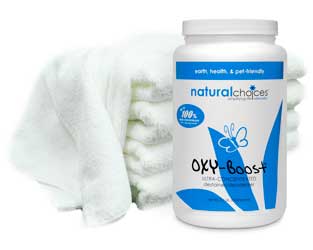|
Information on Oxygen BleachLearn more information on Oxygen Bleach. By now many of you are familiar with powdered oxygen bleaching products seen in stores or advertised on television. 
They range from "Tide with Bleach" to "OxiClean" to "Ajax Oxygen Bleach Powder Cleanser" to "Wolmans Deck and Siding Brightener". While these unique cleaners and stain removers have been around for years it is only recently that they have come into prominence in the consumer market. This page attempts to look at these products and give you an overview as to what they are, how they work and how they are used. What are Oxygen Bleaches? Oxygen bleaches are materials that release oxygen for cleaning and bleaching of stains and dirt upon addition to water. There are three types of oxygen bleaches sold in the consumer market, hydrogen peroxide, sodium percarbonate and sodium perborate. Hydrogen peroxide is a liquid, sodium percarbonate and sodium perborate are powders. Sodium percarbonate is used in deck, carpet, household and laundry cleaning products. Sodium perborate is also a powder and is used mostly in automatic dishwashing and laundry products as a hot water bleaching agent. Sodium perbcarbonate has the highest solubility in water, sodium perborate is more storage stable in detergent formulations.
More information on Oxygen Bleach and the Powdered Form Powdered bleaches are made by treating natural soda ash or natural borax with hydrogen peroxide. These materials can absorb the oxygen while remaining free flowing solids. Upon dissolving in water, they release the oxygen. (One popular infomercial seen on television claims that their oxygen bleach takes the oxygen right out of the air which is totally false!!) You got to watch those Infomericals. Pure sodium percarbonate contains about 13-14% oxygen and sodium perborate contains about 10-15% oxygen. A Word On Liquid Oxygen Bleaches As mentioned previously, another way to purchase oxygen bleach is as a water solution of hydrogen peroxide. It releases oxygen which does the cleaning and bleaching leaving only water as the byproduct. Hydrogen peroxide can be purchased in many dilutions. Many consumers use 3% hydrogen peroxide for general household purposes. Another popular dilution is the 35% food grade which doesn't contain chemical stabilizers as the 3% solution does. However this does shorten the shelf stability. While the purchase price of hydrogen peroxide products are cheaper than the powdered versions you must consider that much of the product is water. On an oxygen equivalency basis the costs are similar.
While hydrogen peroxide solutions have the advantage over powdered products of being sold ready to use, powdered bleaches are easier to handle, have better storage stability and do not need any added chemicals to enhance stability. Differences In Oxygen Bleaching Products There are four categories of powdered oxygen bleach products being sold in the consumer market. They are:
Ultra-Concentrated Oxygen Bleaches Ultra-concentrated bleaches generally contain from 80-100% oxygen bleach (usually sodium percarbonate). While the most expensive to purchase they are also the most effective products for bleaching and cleaning. Ultra-concentrated products are more versatile in the type and severity of jobs they can tackle. Simply, the more oxygen available for cleaning the better. This why I recommend OXY-Boost Products. Also, see Oxy-Boost vs. Other Brand-Names.
Concentrated Oxygen Bleaches Products sold in this classification generally contain 40-70% sodium percarbonate. Infomercial sold oxygen bleaches which used to be sold as ultra-concentrated are now sold under this classification. While now more reasonably priced they do not work as well on really tough cleaning jobs where a more concentrated product is needed. Oxygen bleaches with additives and other cleaning agents One approach that some manufacturers have made is to add surfactants, additives, fillers, detergent builders and other cleaning agents. These additives are used to maintain and assist the oxygen bleaches cleaning ability but lower the overall cost of use. This is especially the case for products targeted for laundry use. Generally these products contain 20-40% bleach. Cleaning products that contain oxygen bleach as an ingredient The vast majority of oxygen bleaching products fall into this category. They include laundry and dishwashing detergents, toilet bowl cleaners, cleansers, deck and siding cleaners, concrete cleaners, carpet cleaners, etc. Generally these products contain 25% or less oxygen bleach. |



